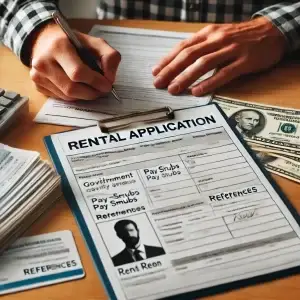If you are a convicted sex offender, you might be wondering, “How do I find housing for sex offenders near me?” A simple online search for “places that rent to sex offenders near me” often won’t yield a straightforward list of available apartments. So, how do you find a place to live? This guide will provide practical steps and resources to help you navigate this challenging process and secure stable housing.
Facing the Challenge: Finding a New Home as a Sex Offender
Finding a new home can be challenging for anyone, but for those with a history of a sex offense, the journey can feel particularly daunting. Have you encountered rejection after rejection from landlords or property managers? You are not alone. Many former offenders face significant barriers when it comes to securing stable housing. These challenges, however, are not insurmountable. With the right strategies and resources, you can find a safe and supportive place to call home.
The first step in overcoming these challenges is understanding the unique obstacles you may face. Housing restrictions, often dictated by local and state laws, can limit where you are allowed to live. Also, landlords may have policies against renting to individuals with a criminal record. This can make the search process feel frustrating and hopeless. But remember, there are solutions and supportive communities out there that are dedicated to helping you succeed.
Let’s explore some practical steps and resources to help you on your journey. From identifying second-chance rentals to creating a strong rental application, there are various strategies you can employ to increase your chances of finding a home. Organizations and support networks can also provide invaluable assistance and guidance. By taking proactive steps and utilizing available resources, you can navigate this challenging landscape and find the housing you need.
It’s important to stay positive and persistent. Every challenge you face is an opportunity to grow and learn. As you embark on this journey, know that there are people and organizations ready to support you every step of the way. Together, we can explore the solutions to help you secure a stable and safe home.
A Second Chance: You Deserve a Safe and Stable Home
What are Your Housing Rights?
Understanding your rights and protections is crucial in ensuring you find a place to rebuild your life. Have you ever wondered what protections are in place to help you secure housing? Knowing your rights can empower you to navigate the housing market more effectively and confidently.
As someone with a criminal record, you have the right to be treated fairly in the housing market. While it is true that landlords and property managers can consider your criminal history when deciding whether to rent to you, there are laws designed to prevent discrimination and ensure that you are given a fair chance. For example, the Fair Housing Act prohibits discrimination based on race, color, national origin, religion, sex, familial status, and disability. While this law does not specifically mention criminal history, it can still offer some protections.
Additionally, some states and cities have enacted their own laws to protect individuals with criminal records. These laws may include “ban the box” policies, which prevent landlords from asking about your criminal history on initial housing applications. Instead, they are required to evaluate your application based on your current qualifications, like your income and credit history, before considering your past.
It’s also important to know that you have the right to appeal a denial. If a landlord denies your application because of your criminal record, they should provide you with a reason. This gives you the opportunity to address any concerns and potentially overturn the decision.
Understanding your rights and protections is essential for navigating the housing market. By being informed and proactive, you can overcome the obstacles you face and find a stable and safe home. Remember, everyone deserves a second chance, and there are resources and legal protections available to help you achieve that.
Understanding Your Rights and Legal Framework
Can Sex Offenders Live in Apartments?
Navigating the legal landscape of housing as a sex offender can be complex and challenging. You may be wondering, can sex offenders live in apartments? The answer is not straightforward, as it depends on various factors, including federal, state, and local laws. Understanding these laws is essential to securing a stable home.
At the federal level, there is no blanket law that prohibits sex offenders from living in apartments. However, the Fair Housing Act offers some protection by prohibiting discrimination based on race, color, national origin, religion, sex, familial status, and disability. While this act does not explicitly cover criminal history, guidance from the Department of Housing and Urban Development (HUD) suggests that blanket bans on renting to individuals with criminal records could be discriminatory, particularly if they disproportionately affect certain racial or ethnic groups.
State and local laws vary significantly. Some states have residency restrictions that prevent sex offenders from living near schools, parks, or other places where children gather. These restrictions can limit your housing options, but they do not outright prohibit living in apartments. For instance, in California, sex offenders are restricted from living within 2,000 feet of a school or park, but they can live in apartments that do not fall within these restricted zones.
Local jurisdictions may have additional restrictions or requirements. For example, some cities or counties have more stringent rules regarding where sex offenders can reside. It is crucial to check the specific laws in your area to understand any limitations you may face. Resources like your state’s sex offender registry or local legal aid organizations can provide detailed information on these laws.
In many cases, landlords have the discretion to rent to sex offenders but may choose not to due to their own policies or perceived liabilities. It’s essential to be prepared to discuss your situation honestly and show how you are a responsible and reliable tenant.
By understanding the legal framework and your rights, you can better navigate the housing market and find an apartment that meets your needs. Remember, while there are challenges, there are also protections and resources available to support you in securing a stable home.
Navigating Housing Restrictions and Requirements
How Can You Navigate Local and State Restrictions on Where You Can Live?
Navigating local and state housing restrictions can be a challenging part of your journey to finding a stable home. These restrictions often vary widely and can significantly impact where you are allowed to live. However, understanding these regulations and knowing how to work within them can help you find suitable housing. Let’s explore how you can navigate these restrictions effectively.
First, it’s crucial to familiarize yourself with the specific laws in your state and local area. States often have residency restrictions that prevent sex offenders from living near schools, parks, playgrounds, or other places where children congregate. For example, California prohibits registered sex offenders from living within 2,000 feet of a school or park. Similarly, Florida has strict residency requirements that limit where sex offenders can reside. Understanding these laws will help you identify areas where you are legally allowed to live.
To navigate these restrictions, start by researching the specific zoning laws and residency restrictions in your desired area. Your state’s sex offender registry website is an excellent resource for this information. Additionally, contacting local law enforcement or legal aid organizations can provide clarity on the local regulations that apply to you.
Once you have a clear understanding of the restrictions, use mapping tools to identify compliant areas. Online mapping services can help you visualize safe zones where you can legally reside. Some sex offender registry websites also offer mapping tools that highlight restricted areas, making it easier to find potential housing options.
When searching for housing, it’s essential to communicate openly with potential landlords. Explain your situation and the steps you have taken to comply with local laws. Transparency can build trust and increase your chances of securing a rental. Additionally, seeking out second-chance rentals and sex offender-friendly apartments can be a practical approach. These types of housing options are specifically designed to help individuals with criminal records, including sex offenders, find stable homes.
Support organizations and reentry programs can also be invaluable resources. Organizations like the National Housing Law Project provide guidance and advocacy for individuals facing housing discrimination. Local reentry programs may offer assistance with finding housing that meets legal requirements.
Finally, consider seeking legal advice if you encounter difficulties. Legal professionals specializing in housing law can help you understand your rights and navigate complex restrictions. They can also advocate on your behalf if you face discrimination or unfair treatment.
By taking these steps and utilizing available resources, you can effectively navigate local and state housing restrictions. Remember, while the process may be challenging, there are solutions and supportive communities out there to help you find a stable and safe home.
Practical Steps to Finding Housing
How Do Sex Offenders Find Housing?
Finding housing as a sex offender can be a daunting task, but by taking the right steps and using available resources, you can increase your chances of success. Let’s look at the first steps you should take when beginning your housing search.
Understand Your Legal Restrictions
- The first step is to familiarize yourself with the legal restrictions that apply to you. Each state and local jurisdiction has its own set of rules regarding where sex offenders can live. It’s crucial to understand these laws to avoid wasting time on housing options that are not legally available to you. Check your state’s sex offender registry website for detailed information on residency restrictions. Local law enforcement agencies and legal aid organizations can also provide guidance.
Gather Important Documents
- Before you start contacting potential landlords, gather all the necessary documents you will need during the application process. This includes:
- A government-issued ID
- Proof of income (pay stubs, tax returns, or bank statements)
- References from previous landlords or employers
- A letter of explanation regarding your criminal history, if necessary
Having these documents ready will streamline the application process and show landlords that you are organized and prepared.
Create a Housing Plan
- Develop a clear housing plan outlining your goals and the steps you need to take to achieve them. Consider factors such as budget, location, and type of housing. Determine how much you can afford to pay for rent and utilities each month, and identify areas that comply with legal restrictions. Setting realistic goals and having a plan in place will help keep you focused and motivated.
Research Second Chance Rentals and Sex Offender-Friendly Housing
- Look for second-chance rentals and sex offender-friendly housing options. These types of housing providers are more likely to rent to individuals with criminal records. Use online resources like Zillow, Craigslist, and specialized websites that list second chance housing. Additionally, reach out to local reentry programs and support organizations that assist former offenders in finding housing. They often have connections with landlords who are willing to rent to sex offenders.
Network and Seek Recommendations
- Networking can be a powerful tool in your housing search. Reach out to friends, family, and support groups to see if they know of any housing opportunities. Sometimes, personal recommendations can open doors that might otherwise be closed. Join online forums and communities where people share their experiences and advice on finding housing as a sex offender.
Be Honest and Transparent
- When you find a potential housing opportunity, be honest and transparent with the landlord about your situation. Explain your criminal history and the steps you have taken to rehabilitate and integrate back into society. Providing references and demonstrating your reliability can help build trust and increase your chances of securing a rental.
Consider Legal Assistance
- If you face significant barriers or discrimination during your housing search, consider seeking legal assistance. Organizations like the National Housing Law Project can provide legal advice and advocacy to help you navigate these challenges.
By taking these first steps, you can approach your housing search with a clear plan and the resources you need to succeed. Remember, persistence and a proactive approach are key to overcoming the obstacles you may face. With determination and support, you can find a stable and safe home.
Creating a Housing Plan: Steps to Get Started
Have You Outlined a Clear Plan for Your Housing Search?
Having a clear and structured housing plan is essential to navigating the complex process of finding a new home as a sex offender. A well-thought-out plan helps you stay organized, focused, and proactive. Let’s explore the steps to create an effective housing plan.
Assess Your Financial Situation
- Start by evaluating your financial situation. Determine your monthly income and expenses to understand how much you can afford to spend on rent and utilities. Consider all sources of income, including employment, benefits, and any financial assistance you might receive. Create a budget that outlines your monthly expenses and sets aside an affordable amount for housing.
Understand Your Legal Restrictions
- Familiarize yourself with the specific legal restrictions in your state and local area. Each jurisdiction has different rules regarding where sex offenders can live. Check your state’s sex offender registry website for detailed information on residency restrictions. Understanding these laws will help you identify areas where you can legally reside and avoid wasting time on non-compliant housing options.
Identify Your Housing Needs and Preferences
- Think about your specific housing needs and preferences. Consider factors such as:
- The type of housing you are looking for (apartment, house, shared housing, etc.)
- Proximity to work, public transportation, and essential services
- Safety and security features
- Access to support services and community resources
Creating a list of your needs and preferences will help you focus your search and identify suitable housing options.
Research Potential Housing Options
- Begin researching potential housing options that meet your needs and comply with legal restrictions. Look for second chance rentals and sex offender-friendly housing options. Utilize online resources like Zillow, Craigslist, and specialized websites that list second chance housing. Reach out to local reentry programs and support organizations that assist former offenders in finding housing. They often have connections with landlords who are willing to rent to sex offenders.
Gather Necessary Documents
 Prepare all the necessary documents you will need during the application process. This includes:
Prepare all the necessary documents you will need during the application process. This includes:
- A government-issued ID
- Proof of income (pay stubs, tax returns, or bank statements)
- References from previous landlords or employers
- A letter of explanation regarding your criminal history, if necessary
Having these documents ready will streamline the application process and demonstrate your preparedness to potential landlords.
Develop a List of Potential Landlords
- Create a list of potential landlords and property managers who are known to rent to individuals with criminal records. Use your research and network to compile this list. Personal recommendations and support from reentry programs can be invaluable in identifying willing landlords.
Prepare for Landlord Interactions
- When contacting potential landlords, be honest and transparent about your situation. Explain your criminal history and the steps you have taken to rehabilitate and integrate back into society. Providing references and demonstrating your reliability can help build trust and increase your chances of securing a rental.
Network and Seek Support
- Networking can play a crucial role in your housing search. Reach out to friends, family, and support groups to see if they know of any housing opportunities. Join online forums and communities where people share their experiences and advice on finding housing as a sex offender. Support organizations and reentry programs can also provide valuable assistance and resources.
Stay Organized and Persistent
- Keep track of your housing search efforts by maintaining a detailed log of the properties you have contacted, their responses, and any follow-up actions needed. Staying organized will help you manage your search more effectively and ensure you don’t miss any opportunities. Persistence is key – don’t get discouraged by rejections. Keep searching and applying until you find a suitable home.
By outlining a clear and structured housing plan, you can navigate the housing search process more effectively. Remember, with determination, organization, and support, you can overcome the challenges and find a stable and safe home.
Identifying Potential Housing Options
Housing for Sex Offenders Near Me: Where to Look
Finding housing as a sex offender can be challenging, but knowing where to look can significantly improve your chances of success. Let’s explore some effective strategies and resources to help you identify housing options that accept sex offenders in your area.
Online Housing Search Platforms
- Online housing search platforms are a valuable resource for finding available rentals. Websites like Zillow, Craigslist, and Rent.com allow you to filter your search based on location, price range, and housing type. While these platforms don’t specifically list sex offender-friendly housing, they can help you identify potential properties. After finding suitable options, you can contact landlords directly to discuss your situation and inquire about their policies.

Second Chance Rentals
- Second-chance rentals are properties specifically designed to help individuals with criminal records, including sex offenders, find stable housing. These properties are often managed by landlords who are more willing to work with tenants who have a criminal history. Websites like Second Chance Apartments and My Second Chance Rentals provide listings of second-chance rental properties across the country. These resources can be particularly helpful in identifying sex offender-friendly housing options.
Local Reentry Programs and Support Organizations
- Reentry programs and support organizations play a crucial role in helping former offenders find housing. These organizations often have established relationships with landlords and property managers who are willing to rent to sex offenders. Reach out to local reentry programs, halfway houses, and non-profit organizations that focus on assisting individuals with criminal records. Some organizations to consider include:
Faith-Based Organizations
- Many faith-based organizations offer support and resources for individuals seeking housing after incarceration. Churches, synagogues, mosques, and other religious institutions may have connections with landlords or operate housing programs themselves. Contact local faith-based organizations to inquire about available resources and housing opportunities.
Networking and Word of Mouth
- Networking is a powerful tool in your housing search. Reach out to friends, family, and support groups to see if they know of any housing opportunities. Sometimes, personal recommendations can open doors that might otherwise be closed. Additionally, join online forums and communities where people share their experiences and advice on finding housing as a sex offender. Websites like Prison Talk offer forums where you can connect with others who have faced similar challenges.
Legal Aid and Advocacy Organizations
- Legal aid and advocacy organizations can provide valuable assistance in your housing search. These organizations often have resources and connections that can help you find housing. They can also offer legal advice if you encounter discrimination or other challenges. Some organizations to consider include:
Social Services and Government Agencies
- Contact local social services and government agencies for housing assistance. Many communities have programs designed to help individuals with criminal records find stable housing. These agencies can provide information on available housing resources, financial assistance programs, and support services.

By utilizing these resources and strategies, you can increase your chances of finding housing that accepts sex offenders in your area. Remember, persistence and a proactive approach are key to overcoming the challenges you may face. With determination and support, you can find a stable and safe place to call home.
Second Chance Rentals for Sex Offenders
What Are Second Chance Rentals and How Can They Help You?
Second-chance rentals are housing opportunities specifically designed to help individuals with criminal records, including sex offenders, find stable and supportive living arrangements. These rentals provide a crucial lifeline for those who face significant barriers in the traditional housing market due to their past convictions. Let’s explore what second-chance rentals are and how they can help you secure a stable home.
Understanding Second Chance Rentals
- Second-chance rentals are properties managed by landlords or property management companies that are willing to rent to individuals with criminal records. These landlords understand that everyone deserves a second chance and are often more lenient when it comes to background checks. Their goal is to provide a stable living environment that supports rehabilitation and reintegration into society.These rentals can be found in various types of housing, including apartments, houses, and shared living arrangements. They may offer short-term or long-term leases, depending on the needs of the tenant. Second chance rentals are typically found through specialized housing programs, reentry organizations, and supportive housing networks.
Benefits of Second Chance Rentals
- Second chance rentals offer several benefits for individuals with a criminal record:
- Increased Housing Opportunities: These rentals significantly expand your housing options by focusing on landlords who are willing to consider applicants with criminal histories.
- Supportive Environment: Many second chance rentals are connected with reentry programs and support services that can help you address other challenges, such as finding employment or accessing mental health care.
- Reduced Stigma: Renting from a second chance landlord can help reduce the stigma associated with your criminal record, as these landlords are often more understanding and supportive of your efforts to rebuild your life.
- Stability and Security: Securing stable housing is a critical step in your reintegration process. Second chance rentals provide a safe and secure living environment where you can focus on personal growth and development.
How to Find Second Chance Rentals
- Finding second chance rentals requires some research and persistence. Here are some steps to help you get started:
- Utilize Online Resources: Websites like Second Chance Apartments and My Second Chance Rentals provide listings of second chance rental properties across the country. These platforms are designed to connect you with landlords who are open to renting to individuals with criminal records.
- Reach Out to Reentry Programs: Local reentry programs and support organizations often have connections with second chance landlords. These programs can provide referrals and assistance in your housing search. Organizations like The National Reentry Resource Center and The Fortune Society are great places to start.
- Network with Supportive Communities: Join online forums and communities where people share their experiences and advice on finding housing as a sex offender. Websites like Prison Talk offer forums where you can connect with others who have faced similar challenges and learn from their experiences.
- Contact Legal Aid Organizations: Legal aid organizations can offer guidance and support in your housing search. They can help you understand your rights and navigate any legal obstacles you may encounter. Consider reaching out to organizations like The National Housing Law Project and Legal Services Corporation.
Preparing for the Application Process
- When applying for a second chance rental, it’s essential to be honest and transparent about your criminal history. Here are some tips to help you prepare:
- Gather Necessary Documents: Prepare all the necessary documents, including a government-issued ID, proof of income, references from previous landlords or employers, and a letter of explanation regarding your criminal history.
- Create a Strong Application: Highlight your current stability and positive attributes. Provide references that can vouch for your character and reliability. Demonstrate your commitment to rehabilitation and reintegration.
- Be Transparent and Honest: When discussing your criminal history with potential landlords, be upfront about your past and the steps you have taken to rehabilitate. Transparency can build trust and increase your chances of securing a rental.
By leveraging second chance rentals, you can overcome the barriers you face in the traditional housing market and find a stable and supportive place to call home. Remember, persistence and a proactive approach are key to finding the right housing opportunity for you. With determination and the right resources, you can secure a second chance rental and begin building a brighter future.
Apartments That Accept Sex Offenders Near Me
How Can You Identify Apartments That Accept Sex Offenders?
Identifying apartments that accept sex offenders can be challenging, but with the right approach and resources, you can find housing that meets your needs. Here are some practical steps to help you locate apartments that accept sex offenders in your area.
Utilize Specialized Online Resources
- Several websites and online platforms are specifically designed to help individuals with criminal records, including sex offenders, find housing. These platforms often list apartments and rental properties that are known to accept tenants with criminal histories. Some helpful websites include:
- Second Chance Apartments: This site provides listings of apartments that accept individuals with criminal records, including sex offenders.
- My Second Chance Rentals: Another platform that offers a database of second chance rental properties across the country.
- Craigslist: While not specifically for second chance rentals, Craigslist can be a valuable resource for finding individual landlords who may be more flexible about renting to sex offenders.
Contact Local Reentry Programs and Support Organizations
- Local reentry programs and support organizations are excellent resources for finding apartments that accept sex offenders. These organizations often have established relationships with landlords who are willing to rent to individuals with criminal histories. Some organizations to consider include:
- The National Reentry Resource Center: Provides resources and support for individuals reentering society after incarceration.
- The Fortune Society: Offers various reentry services, including housing assistance.
- The Safer Foundation: Focuses on helping individuals with criminal records find employment and housing.
Reach Out to Faith-Based Organizations
- Faith-based organizations often provide support and resources for individuals seeking housing after incarceration. Churches, synagogues, mosques, and other religious institutions may have connections with landlords or operate housing programs themselves. Contact local faith-based organizations to inquire about available resources and housing opportunities.
Network and Seek Recommendations
- Networking can be a powerful tool in your housing search. Reach out to friends, family, and support groups to see if they know of any housing opportunities. Personal recommendations can sometimes open doors that might otherwise be closed. Additionally, join online forums and communities where people share their experiences and advice on finding housing as a sex offender. Websites like Prison Talk offer forums where you can connect with others who have faced similar challenges.
Utilize Legal Aid and Advocacy Organizations
- Legal aid and advocacy organizations can provide valuable assistance in your housing search. These organizations often have resources and connections that can help you find housing. They can also offer legal advice if you encounter discrimination or other challenges. Some organizations to consider include:
- The National Housing Law Project: Provides legal assistance and advocacy for housing issues.

- Legal Services Corporation: Offers legal aid to low-income individuals, including those with criminal records.
- American Civil Liberties Union (ACLU): Advocates for the rights of individuals, including housing rights for those with criminal records.
- The National Housing Law Project: Provides legal assistance and advocacy for housing issues.
Research Property Management Companies
- Some property management companies specialize in or are known for being more lenient towards renting to individuals with criminal histories. Research local property management companies and inquire about their policies regarding renting to sex offenders. Companies that advertise themselves as “second chance” property managers are often more willing to consider tenants with criminal records.
Be Honest and Transparent
- When contacting potential landlords or property managers, be honest and transparent about your situation. Explain your criminal history and the steps you have taken to rehabilitate and integrate back into society. Providing references and demonstrating your reliability can help build trust and increase your chances of securing a rental.
Prepare a Strong Rental Application
- Prepare all necessary documents, such as a government-issued ID, proof of income, references from previous landlords or employers, and a letter of explanation regarding your criminal history. A well-prepared application can demonstrate your responsibility and commitment to maintaining stable housing.
By utilizing these strategies and resources, you can identify apartments that accept sex offenders in your area. Persistence and a proactive approach are essential in overcoming the challenges you may face. With determination and support, you can find a stable and safe place to call home.
Engaging with Landlords and Property Managers
Approaching Landlords: Tips for a Successful Application
Approaching landlords and discussing your criminal history can be intimidating, but honesty and transparency are key to securing a rental. Here are some tips on what to say and how to present your situation effectively:
Be Honest and Transparent
- When you meet or speak with a potential landlord, it’s important to be upfront about your criminal history. Hiding or lying about your past can lead to mistrust and potential eviction if the landlord finds out later. Start by explaining your situation clearly and concisely. For example:
- “Hi, my name is [Your Name]. I want to be upfront and let you know that I have a criminal record. I made some mistakes in the past, but I have taken significant steps to turn my life around and am committed to being a responsible and reliable tenant.”
Explain Your Rehabilitation and Efforts to Improve
- Highlight the positive changes you have made since your conviction. This shows landlords that you are serious about improving your life and can be trusted. Discuss any programs or therapy you have completed, stable employment, and positive references. For example:
- “Since my conviction, I have completed a rehabilitation program and have been actively involved in therapy. I am currently employed at [Your Job] and have received positive references from my employer and previous landlord. I am committed to maintaining a stable and responsible lifestyle.”
Provide References and Supporting Documents
- Providing references from previous landlords, employers, or community leaders can significantly strengthen your application. These references can vouch for your character and reliability. Additionally, prepare all necessary documents, such as proof of income and a government-issued ID. For example:
- “I have included references from my previous landlord and employer, who can vouch for my reliability and character. I have also provided proof of income and my ID for your review.”
Offer a Security Deposit or Higher Rent
- Offering a higher security deposit or paying a few months’ rent in advance can help alleviate any concerns the landlord may have about renting to you. This demonstrates your commitment and financial stability. For example:
- “I am willing to offer a higher security deposit or pay a few month’s rent in advance to provide assurance of my commitment to being a responsible tenant.”
Highlight Your Stability and Future Plans
- Emphasize your current stability and future plans. Discuss your goals and how securing stable housing is a crucial part of your plan to continue improving your life. For example:
- “Securing stable housing is an essential part of my plan to continue improving my life. I am focused on maintaining my job, staying involved in my community, and continuing my personal growth. I am committed to being a responsible and respectful tenant.”

- “Securing stable housing is an essential part of my plan to continue improving my life. I am focused on maintaining my job, staying involved in my community, and continuing my personal growth. I am committed to being a responsible and respectful tenant.”
By approaching landlords with honesty, transparency, and a clear demonstration of your commitment to positive change, you can increase your chances of securing a rental. Remember, persistence and a proactive approach are key to overcoming the challenges you may face.
Conclusion – Your Path to a New Home: Embrace Hope and Perseverance
Securing housing as a sex offender can be a daunting and challenging process, but it is not impossible. By understanding your rights, utilizing available resources, and approaching the housing search with honesty and determination, you can find a stable and supportive place to call home.
Remember, everyone deserves a second chance, and there are landlords and organizations willing to help you succeed. Stay persistent, proactive, and positive throughout your housing search. With the right strategies and support, you can overcome the obstacles you face and build a brighter future.
If you need additional assistance, don’t hesitate to reach out to local reentry programs, legal aid organizations, and support networks. These resources can provide valuable guidance and support on your journey to finding a new home.
Take the first step today and start exploring your housing options. With determination and the right resources, you can find a stable and safe place to rebuild your life.
References:
- Fair Housing Act: U.S. Department of Housing and Urban Development
- California Residency Restrictions: California Department of Justice
- Florida Residency Restrictions: Florida Department of Law Enforcement
- National Housing Law Project: National Housing Law Project
- Second Chance Apartments: Second Chance Apartments
- My Second Chance Rentals: My Second Chance Rentals
- National Reentry Resource Center: National Reentry Resource Center
- The Fortune Society: The Fortune Society
- The Safer Foundation: The Safer Foundation
- Legal Services Corporation: Legal Services Corporation
- American Civil Liberties Union (ACLU): American Civil Liberties Union (ACLU)
- Zillow: Zillow
- Craigslist: Craigslist
- Rent.com: Rent.com
- Prison Talk: Prison Talk
FAQs
1. Where are most sex offenders located?
The states with the highest numbers of registered sex offenders are generally those with larger populations. For specific data, the National Center for Missing & Exploited Children maintains a map of registered sex offenders in the U.S. You can visit their website to access this information.
2. Can I check if a sex offender lives near me?
Yes, you can check if a sex offender lives near you by using online databases and registries. The U.S. Department of Justice maintains the National Sex Offender Public Website (NSOPW), which allows you to search for registered sex offenders by name, address, or location. Visit NSOPW to perform a search.
3. Can a sex offender rent a house in Texas?
Yes, a sex offender can rent a house in Texas, but there may be restrictions based on local laws and ordinances. Texas has specific residency restrictions for sex offenders, particularly regarding proximity to schools, parks, and places where children gather. Sex offenders need to understand these restrictions and seek housing that complies with local regulations.
4. Can a sex offender rent an apartment in Florida?
Yes, a sex offender can rent an apartment in Florida, but similar to Texas, there are residency restrictions that must be observed. Florida law prohibits certain sex offenders from living within 1,000 feet of schools, parks, daycare centers, and other places where children congregate. Offenders should check local laws and ordinances to ensure compliance when seeking rental housing.
Dan Collins is dedicated to helping ex-felons find new opportunities and start fresh. With a background in legal research, Dan provides practical advice and resources for ex-felons, covering everything from travel to reintegration into society. His work aims to empower and support individuals in creating a better future.

